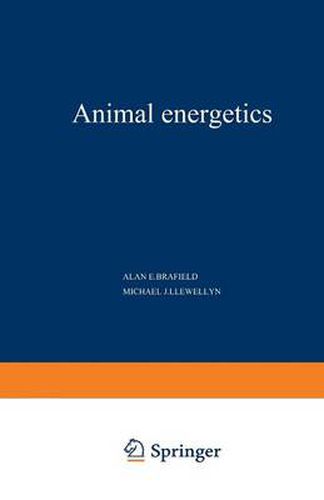Readings Newsletter
Become a Readings Member to make your shopping experience even easier.
Sign in or sign up for free!
You’re not far away from qualifying for FREE standard shipping within Australia
You’ve qualified for FREE standard shipping within Australia
The cart is loading…






This title is printed to order. This book may have been self-published. If so, we cannot guarantee the quality of the content. In the main most books will have gone through the editing process however some may not. We therefore suggest that you be aware of this before ordering this book. If in doubt check either the author or publisher’s details as we are unable to accept any returns unless they are faulty. Please contact us if you have any questions.
All animals, from protozoans to primates, utilize energy in every aspect of their lives. Metabolic processes transform energy within the living cells. Individual animals obtain energy with their food and use it in a variety of ways. Populations and communities pass energy through their ecosystem. The growing interest in animal energetics is therefore seen in three major areas of zoology-biochemistry, physiology and ecology. We have tried to describe the main features of almost all these aspects, with the aim of arousing or feeding an interest in energetics in general as well as supplying some information on particular parts of the subject. The substantial list of references is intended to guide the reader to larger or more specialized works. In covering such a wide field in so small a compass we will have been guilty of over-generalizations, but we find when teaching energetics, whether physiological or ecological, that students easily lose sight of the principles if all statements are hedged about with every relevant condition and exception. We have drawn examples from a wide range of animals, avoiding over-emphasis on mammals, but we have tended to favour those groups with which we are more familiar. We are grateful to many people for helpful discussions and in particular to Kenneth Denbigh, Derek Miller and John Stirling for valuable criticisms of parts of the manuscript. We are responsible for all remaining errors, of course, and will welcome having them drawn to our notice. A.E.B. M.J.L.
$9.00 standard shipping within Australia
FREE standard shipping within Australia for orders over $100.00
Express & International shipping calculated at checkout
This title is printed to order. This book may have been self-published. If so, we cannot guarantee the quality of the content. In the main most books will have gone through the editing process however some may not. We therefore suggest that you be aware of this before ordering this book. If in doubt check either the author or publisher’s details as we are unable to accept any returns unless they are faulty. Please contact us if you have any questions.
All animals, from protozoans to primates, utilize energy in every aspect of their lives. Metabolic processes transform energy within the living cells. Individual animals obtain energy with their food and use it in a variety of ways. Populations and communities pass energy through their ecosystem. The growing interest in animal energetics is therefore seen in three major areas of zoology-biochemistry, physiology and ecology. We have tried to describe the main features of almost all these aspects, with the aim of arousing or feeding an interest in energetics in general as well as supplying some information on particular parts of the subject. The substantial list of references is intended to guide the reader to larger or more specialized works. In covering such a wide field in so small a compass we will have been guilty of over-generalizations, but we find when teaching energetics, whether physiological or ecological, that students easily lose sight of the principles if all statements are hedged about with every relevant condition and exception. We have drawn examples from a wide range of animals, avoiding over-emphasis on mammals, but we have tended to favour those groups with which we are more familiar. We are grateful to many people for helpful discussions and in particular to Kenneth Denbigh, Derek Miller and John Stirling for valuable criticisms of parts of the manuscript. We are responsible for all remaining errors, of course, and will welcome having them drawn to our notice. A.E.B. M.J.L.